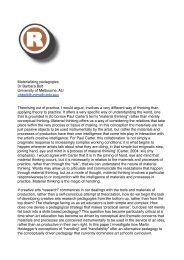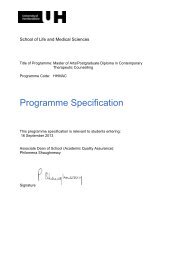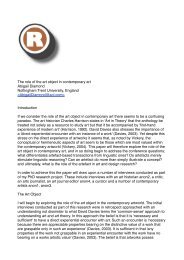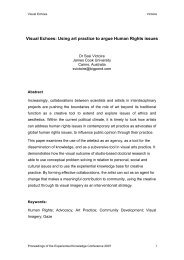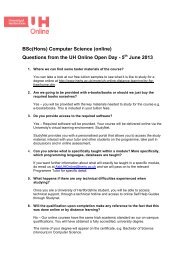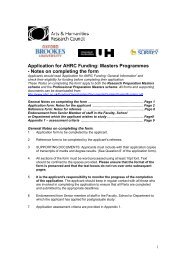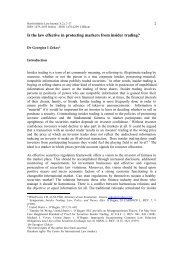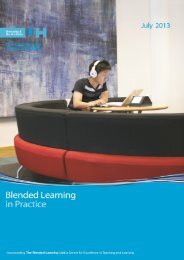Online Role Play Games â The Legal Response - University of ...
Online Role Play Games â The Legal Response - University of ...
Online Role Play Games â The Legal Response - University of ...
You also want an ePaper? Increase the reach of your titles
YUMPU automatically turns print PDFs into web optimized ePapers that Google loves.
Hertfordshire Law Journal 4(2), 72-80 78ISSN 1479-4195 <strong>Online</strong> / ISSN 1479-4209 CDRomAn interesting dilemma also arises in regard to the EULA If a prospective MUpurchases an MMORPG then takes it home, opens the product and attempts to installit. <strong>The</strong> MMORPG then loads and the prospective MU is presented with the EULA onthe screen, which demands an acceptance to the terms before the game can be played.<strong>The</strong> prospective game user subsequently realises that he will not be entitled to ownthe virtual property within the game. On realising this, the prospective MU loosesinterest in playing the game and due to an increase in recent times <strong>of</strong> game piracy isnot allowed to return it once the package is opened. <strong>The</strong>refore the prospective MU hasincurred a loss as the original game, which he has purchased, is <strong>of</strong> no use to him.<strong>The</strong> injustice <strong>of</strong> the situation is that the EULA terms are not made clear to theprospective MU until after the games have been purchased. <strong>The</strong>refore the prospectiveMU has no way <strong>of</strong> knowing that the terms <strong>of</strong> the MMORPG without a great exertion.It is established in the common law and shown in several cases including Olley vMarlborough Court Hotel 24 and Chapleton v Barry 25 that terms must be brought tothe attention <strong>of</strong> the contracting party prior to the time the contract is being made.<strong>The</strong>refore the EULA should not be produced as the game is being installed but shouldbe clearly identified to the purchaser at the time <strong>of</strong> purchasing. So arguably the courtswill not enforce the terms <strong>of</strong> EULA as they have not satisfied this condition.In addition to this, the process <strong>of</strong> clicking the “I accept” button may be seen similar toa signature 26 or even a cross 27 , however there are still several important factors, whichdistinguish them. A written signature is “your name written by yourself, always in thesame way, usually to show that something has been written or agreed by you” 28 Thisdefinition <strong>of</strong> a signature is fundamentally different from what is presented by andEULA. <strong>The</strong> point that the signature “is always in the same way” is a security measure,which, though not perfect, can help to ensure that the person signing is who theyclaim to be. By having a button, which just says, “I accept” there is a clearopportunity for people to misrepresent who they are. It also provides an easy way forjuvenile to accept, which are incapable <strong>of</strong> understanding the EULA.Another problem which arises with the use <strong>of</strong> “I accept” buttons is that many peoplehave spent a lot <strong>of</strong> time shopping online and using s<strong>of</strong>tware all <strong>of</strong> which require the “Iaccept” button to be clicked. It has therefore become such a common thing to some, tojust skip past the “I accept” button without paying any regard for the terms which arecontained on the EULA.Perhaps in this case it would be better to not compare the “I accept” button with asignature but to compare it with an everyday transaction, for example buying goodsfrom a store. When goods are purchased from a store it is not expected that asignature be placed on every transaction. If this reasoning is accurate the clicking <strong>of</strong>the “I accept” button will not follow the harsh rule <strong>of</strong> L’Estrange v Graucob 29 , whichon signing binds the parties by the contract terms regardless <strong>of</strong> if they are read or not.24 Olley v Marlborough Court Hotel [1949] 1 KB 53225 Chapleton v Barry UDC [1940] 1 KB 53226 Supra n.2027 Supra n.2128 Cambridge online dictionary definition29 L’Estrange v Graucob [1934] 2 KB 394© Matthew Lee<strong>The</strong> moral rights <strong>of</strong> the author have been asserted.Database rights <strong>The</strong> Centre for International Law (maker).



